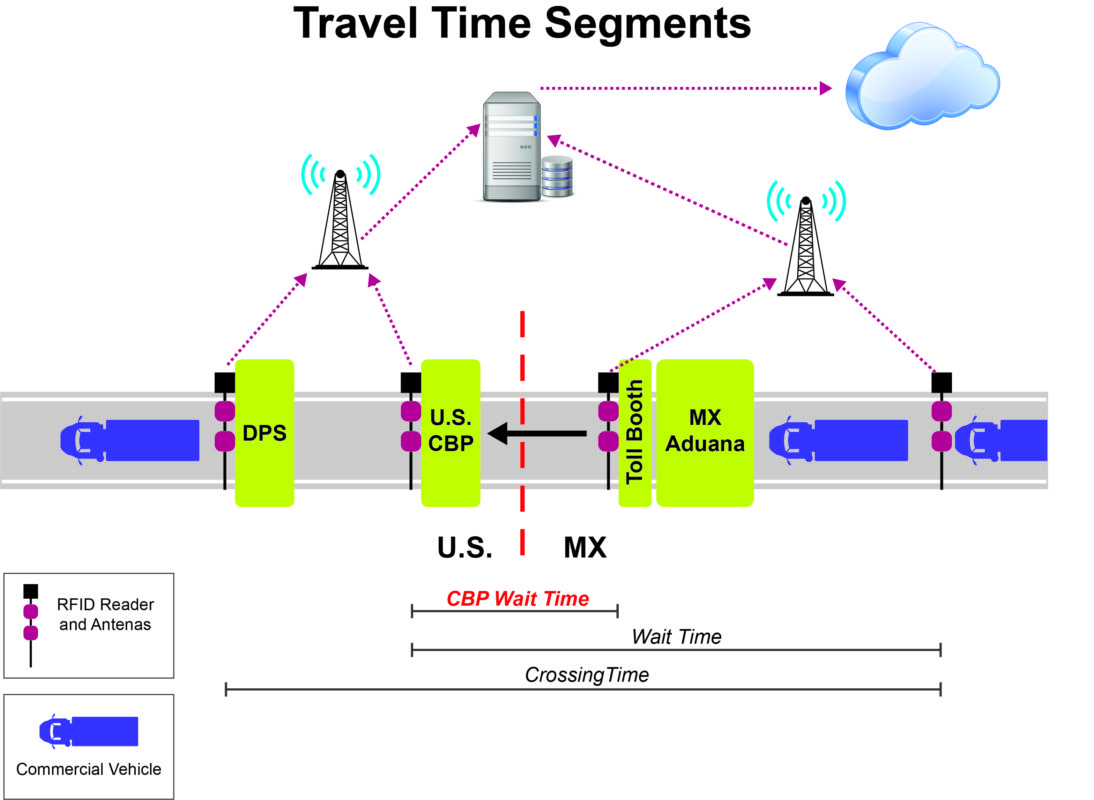TTI investigates Implementation of a Travel-Time Reliability Monitoring System for Land Ports of Entry
What’s the Problem?
In a reliable transportation system, motorists know with a high degree of certainty when they will arrive to their destination. Numerous factors directly affect reliability such as signal timing, work zones, incidents, unusually high demand, special events, weather, and the performance of complementary and competing modes. The purpose of a travel-time reliability monitoring system (TTRMS) is to collect travel-time data from various sources and to monitor travel-time reliability. Such a system allows transportation agencies to quantify travel-time reliability of their transportation networks and evaluate the impact of transportation network improvements on reliability. Moreover, freight carriers can make more informed decisions to minimize their travel times and possibly reducing transportation costs.
In the specific case of land ports of entry (LPOEs), the cross-border trip from origin to destination includes the time it takes for trucks to go through Mexican and U.S. federal and state vehicle inspections. The travel time and travel time reliability depend on traffic volumes and processing times at each of the inspection facilities throughout the border-crossing process. Not all LPOEs at the U.S. borders have the technology to determine travel time, and none of them expand travel-time measurements outside the LPOE. The expansion of travel measurements would benefit freight movement at all LPOEs. To date, no TTRMS has been implemented in any commercial LPOE along the U.S.-Mexico or U.S.-Canada border. However, the implementation of a TTRMS could be beneficial at some of these commercial LPOEs currently measuring travel times (the first key step for a TTRMS).
How Was the Study Done?
Under the second Strategic Highway Research Program (SHRP 2) Implementation Assistance Program, the Texas Department of Transportation (TxDOT) received a grant as lead adopter to implement a truck TTRMS at the Texas-Mexico border using the Ysleta LPOE located in the El Paso-Ciudad Juàrez binational region as a case study. TxDOT requested TTI’s assistance to adapt the SHRP-2 TTRMS guidance to develop the concept of operations (ConOps) and implementation plan for this border truck TTRMS system.
The project focused on analysis and planning implementation of a TTRMS in the El Paso region and beyond the border crossing at El Paso, specifically at the Ysleta LPOE, where there is already a radio-frequency identification (RFID) travel-time measurement system in place. This included examination of data sets and sources, stakeholder input, development of a concept of operations (ConOps), and an implementation plan for cross-border TTRMS for commercial vehicles. The system proposed is described in detail in the ConOps and is adapted to the specific needs of TxDOT and carriers transporting goods from Ciudad Juárez to El Paso via the Ysleta LPOE.
Findings
The implementation plan developed defines and describes a set of actions for implementing a cross-border TTRMS for commercial vehicles at the Ysleta LPOE located in the El Paso-Ciudad Juàrez binational region. This implementation plan assumes that TxDOT will be the leading agency and will identify a technical support team to implement the plan. TxDOT has been operating traffic management centers (TMCs) with the capability to monitor travel times in most urban areas statewide. However, these TMCs do not have the capability to monitor travel-time reliability for cross-border freight traffic.
The implementation plan allows for the implementation of both the system and a light version. The plan consists of the following activities, discussed in detail in the final report:
- Identify the system requirements.
- Design the system.
- Develop the system.
- Implement the pilot.
- Collect stakeholder feedback.
- Incorporate feedback and implement the system.
- Validate the system.
The report also provides an activity schedule and estimated cost for implementation of the system.
Research Benefits
Having a TTRMS in El Paso will greatly benefit freight traffic and all other users. By having real-time information, freight companies will be able to make decisions in real time to minimize travel delays. Freight companies will also be able to continually improve their scheduling by studying daily and seasonal travel time history trends.
The public agencies that provided input to this project, EPMPO and TxDOT, see the benefits of a TTRMS and are working toward gathering more traffic data to complement their goals. TxDOT’s goal to improve its ITS program by having more traffic data on its highway system will complement a future TTRMS. EPMPO is very interested in a regional TTRMS because it would provide data to improve the congestion projections of its travel demand model.
Challenges and Next Steps
Both TxDOT and EPMPO agree that top challenges in the development of a TTRMS will be funding and finding a public agency to sponsor the project. Lack of traffic data for the proposed TTRMS also presents a challenge, but the TxDOT El Paso District continues to be proactive in increasing its Bluetooth sensor infrastructure and exploring other options to complement these traffic data. TxDOT is also exploring, through TTI, how mobility performance measures determined from these sensor data (as well as other possible traffic data sets such as from INRIX) can improve its ITS program. TxDOT’s ITS goals are moving in a positive direction and make the future implementation of a TTRMS viable.
Project Title
Freight Travel Time and Travel Time Reliability at the BorderProject Number
409299
Project Sponsor(s)
The Strategic Highway Research Program 2Texas Department of Transportation
Center for International Intelligent Transportation Research
Project Categories
Freight Movement, Mobility
Project Termination Date
December 2017
Project Publications
For More Information
Juan C. Villa
Research ScientistMexico City Office
Texas A&M Transportation Institute
Texas A&M University System
3135 TAMU
College Station, TX 77843-3135
Ph. (979) 317-2471
[email protected]
